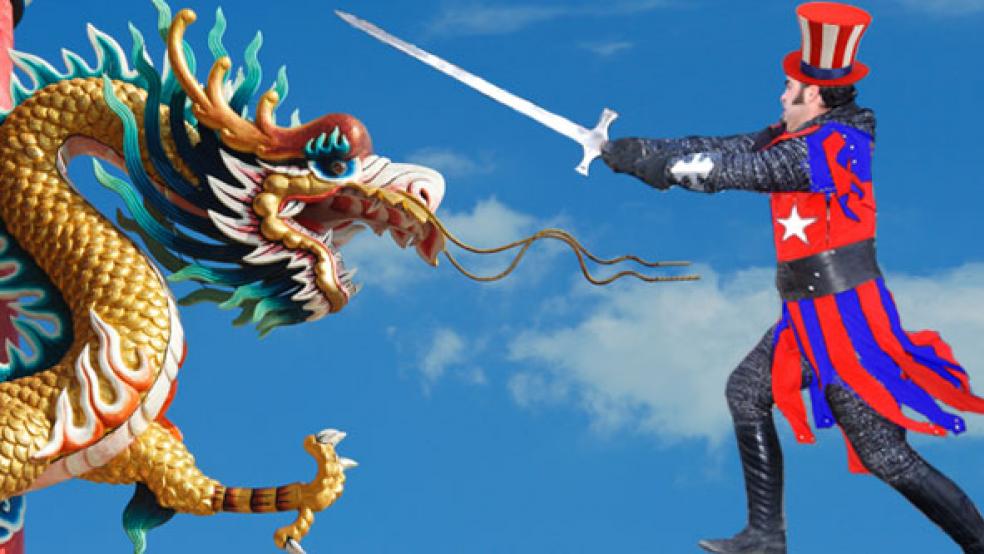As the U.S. remains in a state of seemingly permanent economic malaise and high unemployment, China is booming. This week, China reported $874 billion in exports in the first half of 2011, up 20 percent from a year earlier. The International Monetary Fund forecasts that China’s economy will surpass the U.S. economy in size as soon as 2016. China is the biggest foreign buyer of U.S. Treasury securities. But economists disagree about how the U.S. should respond to China’s extraordinary growth--or if it should respond at all.
“There is no evidence Chinese growth is hurting the U.S. Moreover, economic activity is a positive sum game, and we are actually benefiting from Chinese growth because of increased demand for our products,” says David Backus, an economist at New York University,
Others reject such a rosy view of the Chinese growth story. “China now makes the stuff we used to make. But what they are really exporting to us is unemployment,” says Joseph Gagnon, an economist at the Peterson Institute for International Economics, who previously worked for the Federal Reserve Board. Gagnon is among economists who believe that what is driving China’s growth is manipulation of its currency coupled with tight capital-market controls.
“Capital controls essentially…allow the undervaluation of the Chinese currency in real terms,” says Olivier Jeanne, a Johns Hopkins economist who was formerly at the IMF. “It creates an unassailable basis for undervaluing the renminbi.”
These economists argue that China is manipulating its currency to make its exports more competitive. The Chinese are accumulating U.S. Treasurys not because they believe they are a great investment but as a means to drive up the dollar and drive down the Chinese currency, the renmimbi (also known as the yuan).
U.S. investors face severe capital controls when it comes to doing business with China. Though direct investment in China is allowed – a foreign corporation can build a factory in China -- foreign investors cannot buy Chinese bonds or deposit money in Chinese banks. And there are tight restrictions on foreigners investing in Chinese stocks. These capital controls help curtail foreign demand for and hence appreciation of the renmimbi. They also temper the risk of inflation.
Meantime, the Chinese can freely export capital to the U.S.
The U.S. Treasury hasn’t commented publicly on China’s capital controls, but Treasury Secretary Tim Geithner noted at the U.S.-China Strategic and Economic Dialogue this spring that the renminbi had appreciated five percent against the dollar since last June. “We are seeing very promising shifts in the direction of Chinese economic policy,” he said. "We hope that China moves to allow the exchange rate to appreciate more rapidly and more broadly against the currencies of all its trading partners.”
In March 2010, Sen. Charles Schumer, D-N.Y., and others introduced legislation that would have imposed tariffs and other measures on China if it continued to peg the value of its currency artificially low against the dollar. The bill never made it out of committee.
But that’s the sort of action favored by some U.S. manufacturers Daniel DiMicco, chief executive of Nucor Corp., a Charlotte, N.C.-based steelmaker, told The Wall Street Journal that he favors legislation in Congress that would permit higher import tariffs on goods from countries deemed to be deliberately suppressing the value of their currencies.
Still, for economists who worry about the decline of U.S. manufacturing and believe Chinese currency manipulation and capital controls are driving the U.S. trade deficit with China, tariffs don’t cut it. Gagnon says of Schumer’s bill, “This bill is the equivalent of a few mosquito bites for the Chinese.”
Gagnon and economist Gary Hufbauer want to tax interest and dividends on U.S. Treasurys and other U.S. assets owned by the Chinese government. This would make it more expensive for the Chinese to accumulate Treasurys, and hence more expensive for them to devalue their currency by doing so. Peterson Institute economists John Williamson, Arvind Subramanian, and Olivier Jeanne want to create an international code of practice on capital controls that would rule out much of what China is doing.
“China is not going to change its currency practices in response to foreign measures, this will only invite tit-for-tat counter measures,” says China expert Douglas Paal at the Carnegie Endowment for International Peace. Instead, he says China will change its currency practices on its own once it reaches an internal consensus about how to proceed with the growth in consumption, which could occur as early as 2014.
Aside from possibly triggering a trade war, taxing Chinese financial assets likely would force a plunge in the value of the dollar – which is the point because it would make our exports less expensive – but this could damage the greenback’s status as a reserve currency. These risks, and also gains, are hypothetical; proponents of these ideas concede neither proposal is likely to go anywhere.
Still, says Gagnon, “Compared with what the U.S. is currently doing in response to China, our ideas are heretical”
More about China’s economy from The Fiscal Times:
U.S.-Chinese Tensions Mask Growing Relationship
The Next China a Powerful Consumer Society
Global Economic Recovery Sparks Inflation Fears

